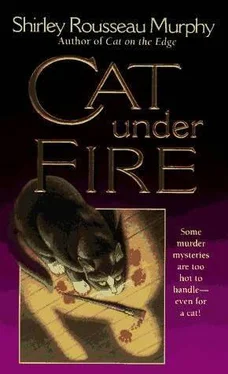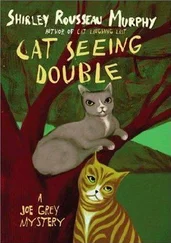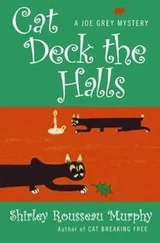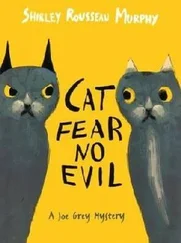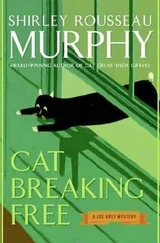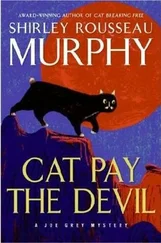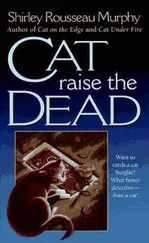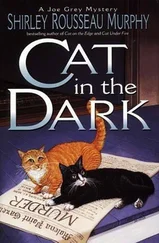Two figures sat within, unmoving silhouettes poised in blackness. Stakeout car. Dulcie smiled and began to purr. Captain Harper had believed her. Harper had acted on her phone call. Just a few feet from them, two of Harper's officers sat in their unmarked vehicle waiting for Varnie and Stamps to go into action.
They thought the time must be about five-fifty. The first mark would leave his house at six-fifteen. Trotting up across the dew-sodden lawns, soon they could see above them the steeply peaked roof of the first mark, the last house on Cypress, number 3920, a handsome white frame dwelling. Lights were on in what looked like a bedroom and bath, and as they hurried upward lights came on in the kitchen. They could hear a radio playing, an announcer's voice; it sounded like the morning weather report. The human need for weather reports always amused them. A cat could smell the rain coming, could feel the change of wind. A cat knows immediately when the barometric pressure changes, by the state of his nerves. High pressure, zowie. Low pressure, nap time. The human paucity of senses was really too bad.
Drawing nearer to 3920, they could hear the faint rumble of water pipes as if someone were taking a shower. And they could smell coffee now, then could smell eggs frying and cigarette smoke.
According to Stamps's list, Tim Hamry would leave the house in about ten minutes, in a white Toyota. His wife, June, should depart five to ten minutes later in an old black Ford sedan. The Hamry's had no children. They had no dogs, and no electronic alarm system.
The cats entered the yard next door, trotting through a bed of dew-laden chrysanthemums, and skinned up a rose trellis to the roof, where they could observe the impending drama. Lying up along the peak, they commanded an unbroken view of 3920 and the surrounding streets. The narrow lanes were lit faintly by residential streetlights, a soft glow at each corner.
The Hamry's bathroom light went out, soon they could hear cutlery on plates.
And as Tim and June Hamry enjoyed breakfast, four blocks down the hill a lone figure leading a large dog appeared, walking up toward the Hamry house. Stamps and the monster.
"Why would he bring the dog?" Dulcie said.
"I don't know. Maybe they use him as a lookout? He barks loud enough." Joe sat taller on the steep shingles, watching Stamps. "They're headed right for the stakeout car. That dog will pitch a fit."
"Oh, no. That will finish it."
They held their breath.
The dog paused at the stakeout car jerking his lead, sniffing at the Chevy. Stamps swore and pulled him along, but the dog, sniffing at the car, let out a roar loud enough to wake the hillside.
Dulcie moaned. It was over. Stamps would see the cops and take off out of there.
But no, the dog stuck his nose to the sidewalk. He huffed and barked, and took off uphill, jerking Stamps along-following not Harper's men but their own trail. He was headed straight for the house on which they sat.
Joe almost fell off the roof laughing, clawing at the shingles. They watched the beast jerk Stamps along for half a block before Stamps got him stopped. Then Stamps slapped him and whipped him with the end of the lead. The beast cowered and snapped at him, but he came to heel on a short lead, and Stamps led him across the street, not approaching 3920, but heading for Varnie's.
No light burned in the brown house. The Blankenship dwelling was dark, but as Stamps approached, the garage door swung open. He moved quickly inside. They heard him speak to the dog, saw it leap into the truck bed. Stamps moved deeper in, toward the front of the truck, out of their sight.
They heard the truck door open and close. A movement in the darkened garage, beside the window, indicated that Varnie was looking up the hill, watching the Hamry house.
The darkened truck waited. The two men would be marking time until the Hamrys left for work. Dulcie yawned and settled more comfortably on the sloping roof. The predawn sky was beginning to gray, black tree branches to appear out of the night. Up beyond the black hills, the taller mountains of the coastal range stood dark against the steely sky.
The garage door of 3920 opened. Tim Hamry appeared, wearing a tan suit and black shoes. He turned away within the lit interior and slid into the white Toyota. They heard the engine start.
He backed out, leaving the garage door open, and headed down the hill, his lights picking out parked cars, flashing across the windows of the stakeout car. Its glass shone blank and empty, as if the officers had ducked down.
Joe studied the faintly lit streets, wondering if there might be a second police unit. Every dark, silent vehicle seemed totally abandoned; he could detect no movement within, no red glow of a cigarette-though no cop would smoke on stakeout. They'd chew, maybe, and spit into a paper cup. The officers would be sipping coffee, hunkered down against the chill, yawning as they watched 3920-and watched Varnie's dark, open garage. Stakeout must be like any hunt. Wait for the prey to make a move, be sure you had him cornered, then nail him.
From within the Hamry's lit garage they heard a door close. A woman in a dark suit appeared, slid into the black Ford, and started the engine. She let it idle for a moment, then backed out.
In the drive she left the car running while she went to turn off the light and close the overhead door. Interesting that they didn't have an electric door. Maybe they had cats-automatic doors were death on cats.
The moment June Hamry drove away, her taillights disappearing down the hill, over at the Blankenships' Varnie started his engine. He didn't turn on his headlights. The motor rumbled unevenly, belching white exhaust. He backed out without lights, the truck's slat sides rattling; its open rear end gaped. In the center of the truck bed, the dog balanced himself heavily, lurching as the truck turned uphill.
Beside the dog reclined four plastic garbage bags, heavily filled, and tied shut. "What's with the bags?" Dulcie hunched lower against the rough shingles, looking.
The truck moved up the hill. Pausing before 3920, it backed into the Hamry's drive as bold as if it belonged there, sat idling as, presumably, the two men watched the windows, making certain the house was indeed empty. Varnie had attached a hand-lettered sign to the side of the truck: Save our earth. Help recycle.
Who would suspect a couple of guys donating their time to collect recyclables? Maybe the bags contained beer cans for a touch of authenticity. The quickening morning breeze picked up a breath of old fish. Scanning the street, Joe saw a second stakeout car.
"There, across the street and down three doors. That old station wagon."
Dulcie looked, wriggling lower against the shingles. "How can you tell? I don't see a soul."
"I saw a little movement behind the glass, just a shifting in the shadows."
Stamps got out of the truck to open the Hamry garage door, and Varnie backed on in. Leaving the garage door open, the two men disappeared inside. The dog remained in the truck bed.
"I'm surprised he'd stay there," Dulcie said. "Stamps didn't tie him."
"Maybe he's not as useless as we thought."
They heard a faint click from within the garage, then the sound of a door softly closing. In a moment a faint light swung across the kitchen windows, jiggling and darting, then disappeared.
"Come on," Dulcie said. "Those windowsills are wide. We can see right in."
"Hold on a minute. I saw car lights way down the hill, then they went out."
The sky was paling toward dawn, the houses beginning to take on dimension, the bushes silhouetted stark and black. Down the street within the stakeout car a shadow moved again, then was still. The cats' paws and ears were freezing. Their early-morning meal of fresh-killed rabbit, which had warmed them nicely for a while, had lost its battle with the chill. And then, glancing down the street below Janet's house, they saw a third car moving without lights. It parked below her house, beneath a row of eucalyptus trees, under the low-hanging leaves.
Читать дальше
